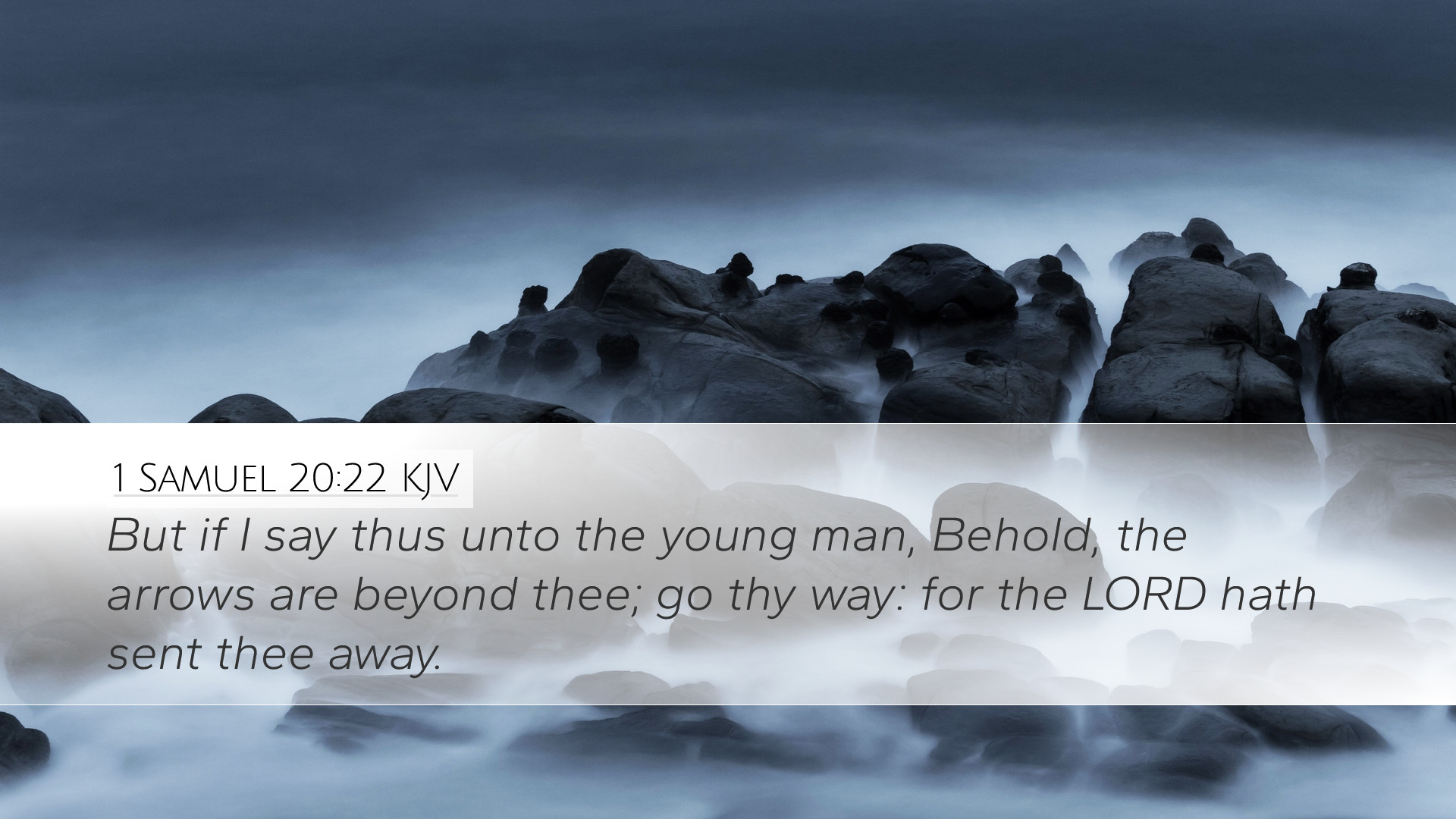Commentary on 1 Samuel 20:22
Bible Verse: 1 Samuel 20:22 - "But if I say to the young man, 'Look, the arrows are beyond you,' go your way; for the Lord has sent you away."
Introduction
The passage of 1 Samuel 20:22 is steeped in emotional and theological significance. It occurs within the narrative of David and Jonathan, illustrating the complex relationship of friendship, loyalty, and the underlying tension of impending conflict. This commentary draws from the insights of notable public domain scholars including Matthew Henry, Albert Barnes, and Adam Clarke, offering a deeper understanding of the backdrop, implications, and lessons derivable from this interaction.
Contextual Background
This verse is part of a larger narrative (1 Samuel 20:1-42) that unfolds the secretive plan between David and Jonathan to communicate Saul's intentions towards David. This historical context is vital to appreciating the weight of the words exchanged. Jonathan, knowing his father Saul's murderous intentions, acts as a protector for David.
Henry observes that this incident highlights Jonathan's profound loyalty to David, which surpasses the familial bonds he has with Saul. This illustrates the weight of divine purpose over human relationships.
Verse Analysis
“But if I say to the young man…”
This beginning phrase underscores the urgency and critical nature of Jonathan's actions. Jonathan’s strategic approach reflects the wisdom necessary in delivering sensitive information. Albert Barnes emphasizes that the reference to “the young man” speaks to the careful concealment of their plans from others, emphasizing the secrecy of their agreement.
“Look, the arrows are beyond you,”
Here, the arrows symbolize a message coded with danger and the need for David to flee. Adam Clarke notes that the act of shooting arrows beyond David indicates a clear signal of urgent peril. The arrows being beyond implies that David is no longer safe in Saul's vicinity, and it signifies Jonathan’s understanding of the gravity of his father's hostility.
“go your way;”
This directive is both a command and a tearful farewell. Henry later reflects that Jonathan’s words carry a burden of sorrow, acknowledging that David must leave to preserve his life. It speaks to the heartache of separation necessitated by loyalty to God’s purpose.
“for the Lord has sent you away.”
Jonathan’s recognition of divine intervention indicates a deep theological understanding that David's exile is not merely a consequence of human conflict but a part of God’s sovereign plan. Barnes highlights that Jonathan places this event in the context of divine will, recognizing that God often uses difficult circumstances to fulfill His promises to David.
Theological Implications
This verse delves into themes of loyalty, divine purpose, and the providence of God. The relationship between Jonathan and David serves as a paradigm to illustrate sacrificial love and the prioritization of divine calling over personal attachments.
- Loyalty and Friendship: The bond between Jonathan and David exemplifies an ideal friendship, where loyalty is so strong that it transcends familial loyalty. This offers a profound reflection for pastors on the nature of godly friendships.
- Divine Sovereignty: The acknowledgment of God's hand in the circumstances brings insight into how believers should respond to life’s adversities, seeing them as part of God's greater plan.
- Separation for God's Purposes: The necessary separation of David from Jonathan prefigures God's work in establishing David as king, emphasizing the idea that separation may sometimes be a part of God’s will.
Conclusion
The narrative encapsulated in 1 Samuel 20:22 serves as a poignant reminder of the depth of divine love, the complexity of human relationships, and the unfathomable wisdom of God's plans. The insights of Henry, Barnes, and Clarke illuminate the text, providing a multi-faceted understanding that is relevant for pastors, students, theologians, and Bible scholars. Ultimately, it challenges readers to consider the nature of their relationships, the sovereignty of God in their lives, and the call to fidelity in friendship amidst trials.


